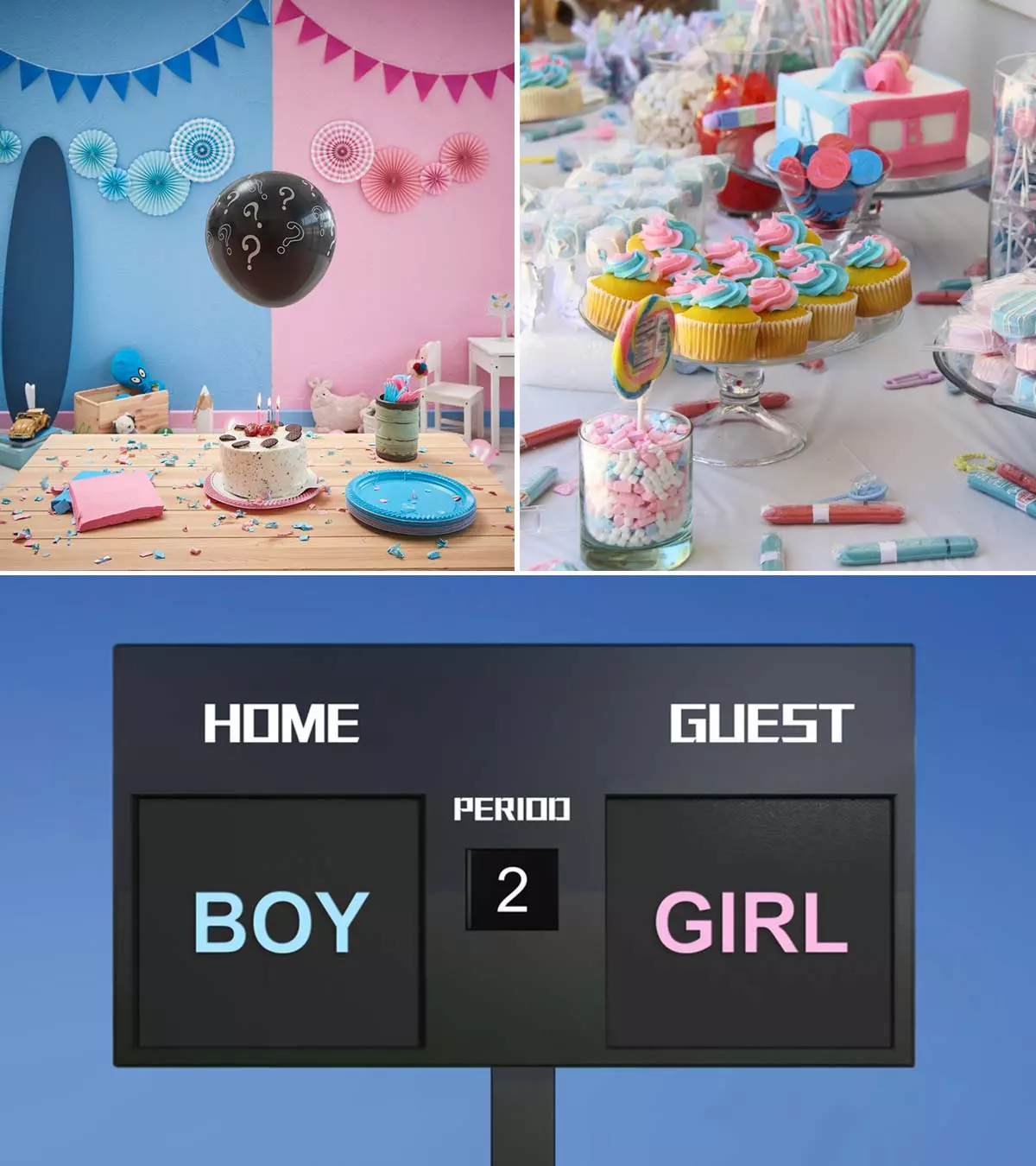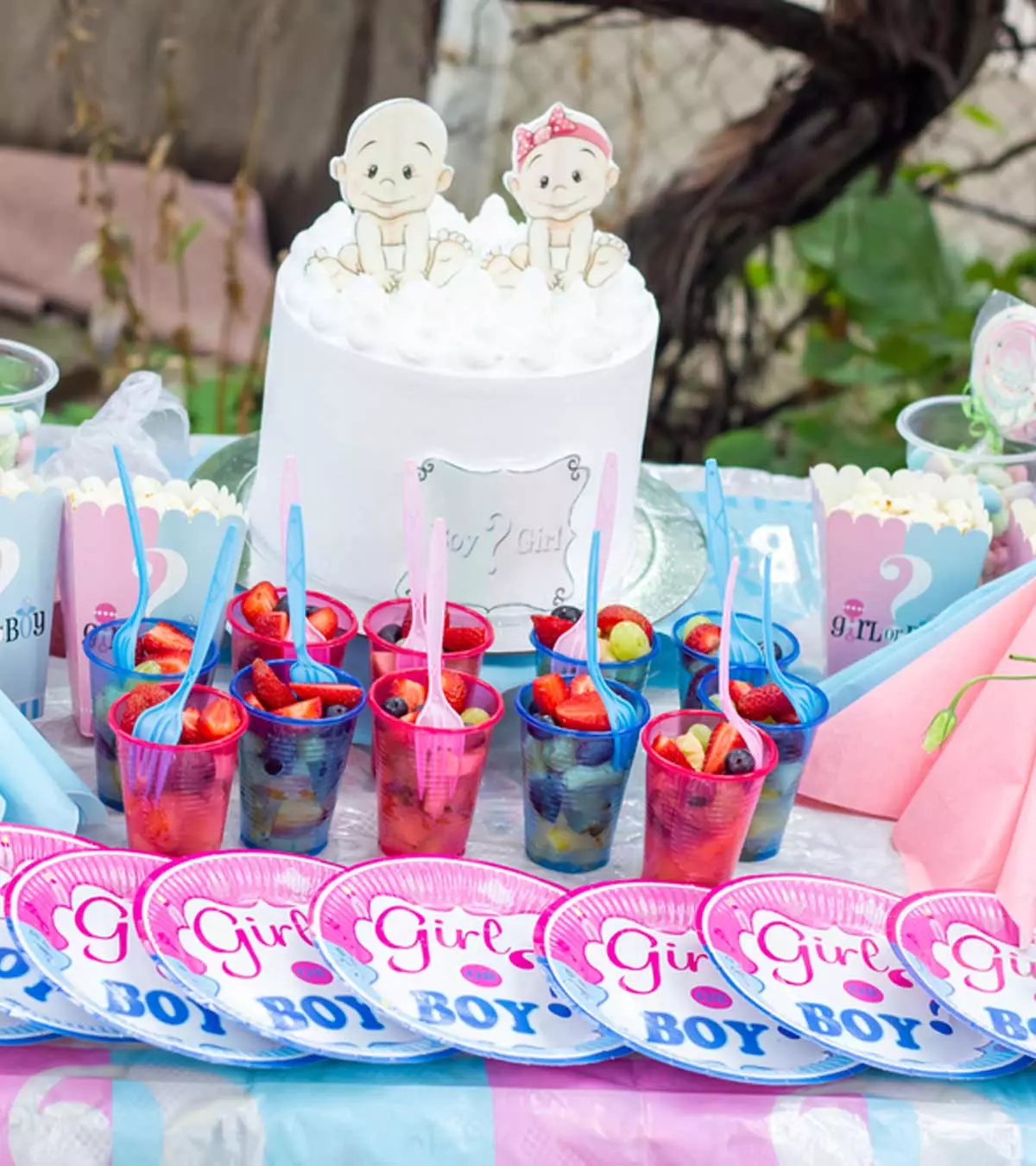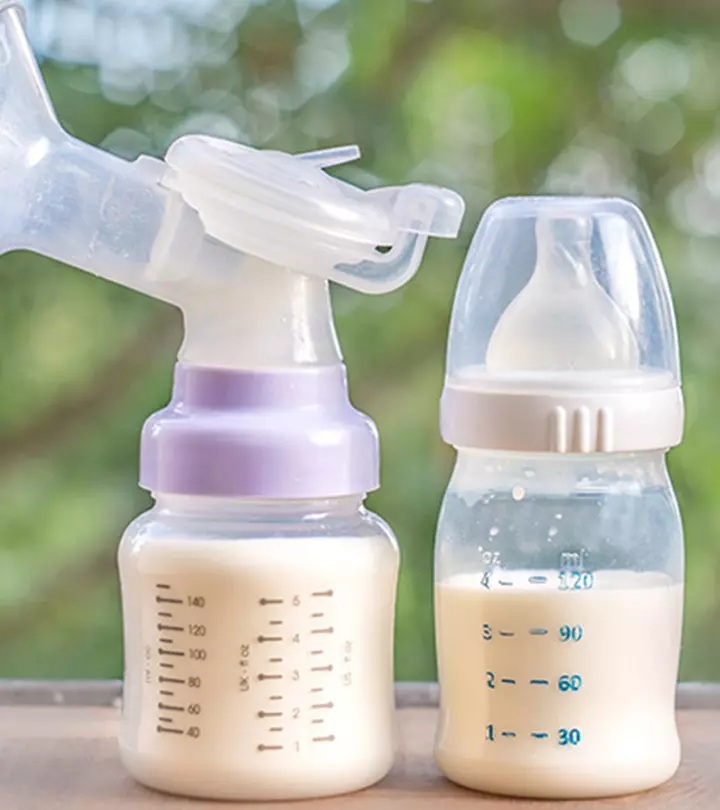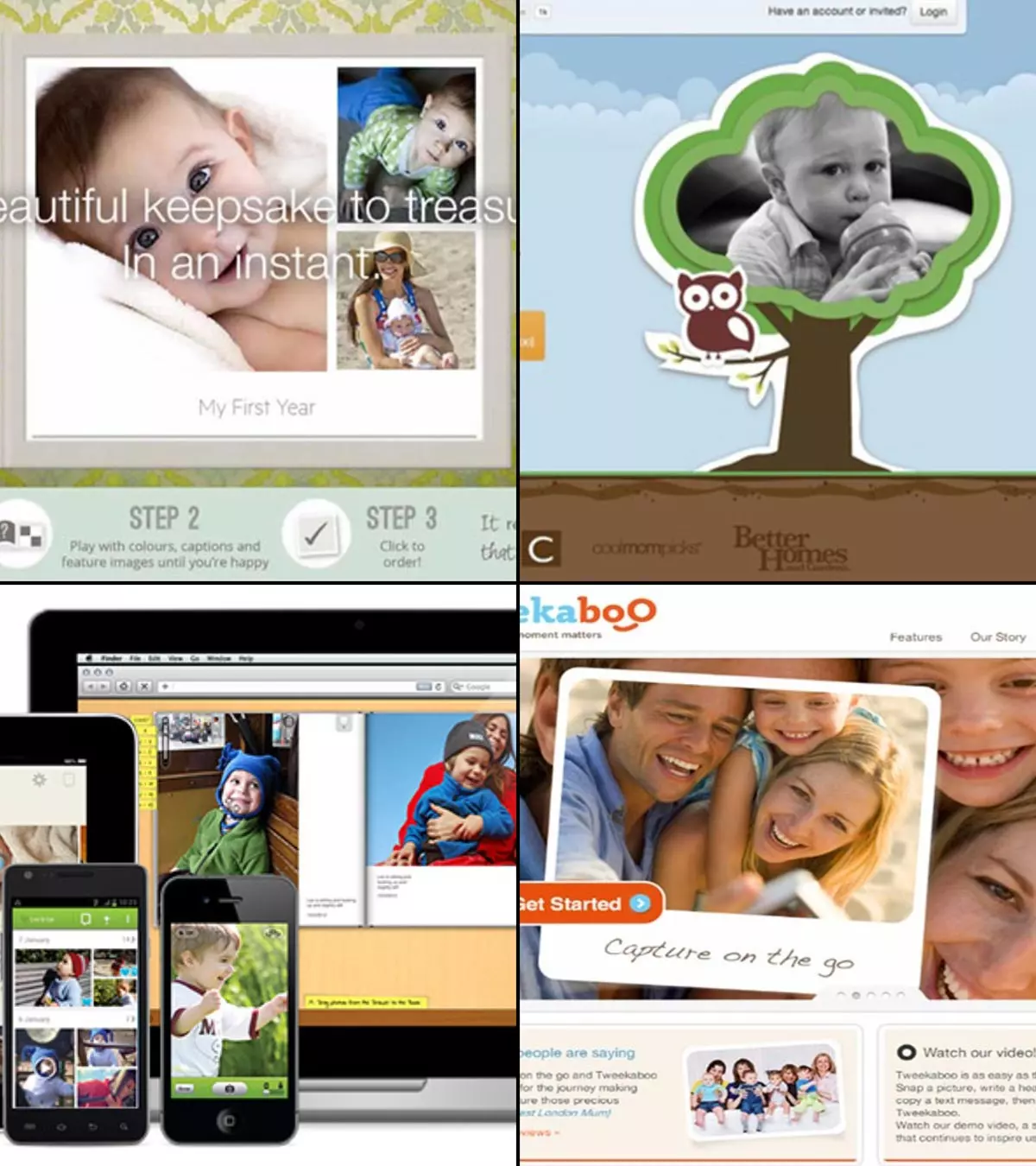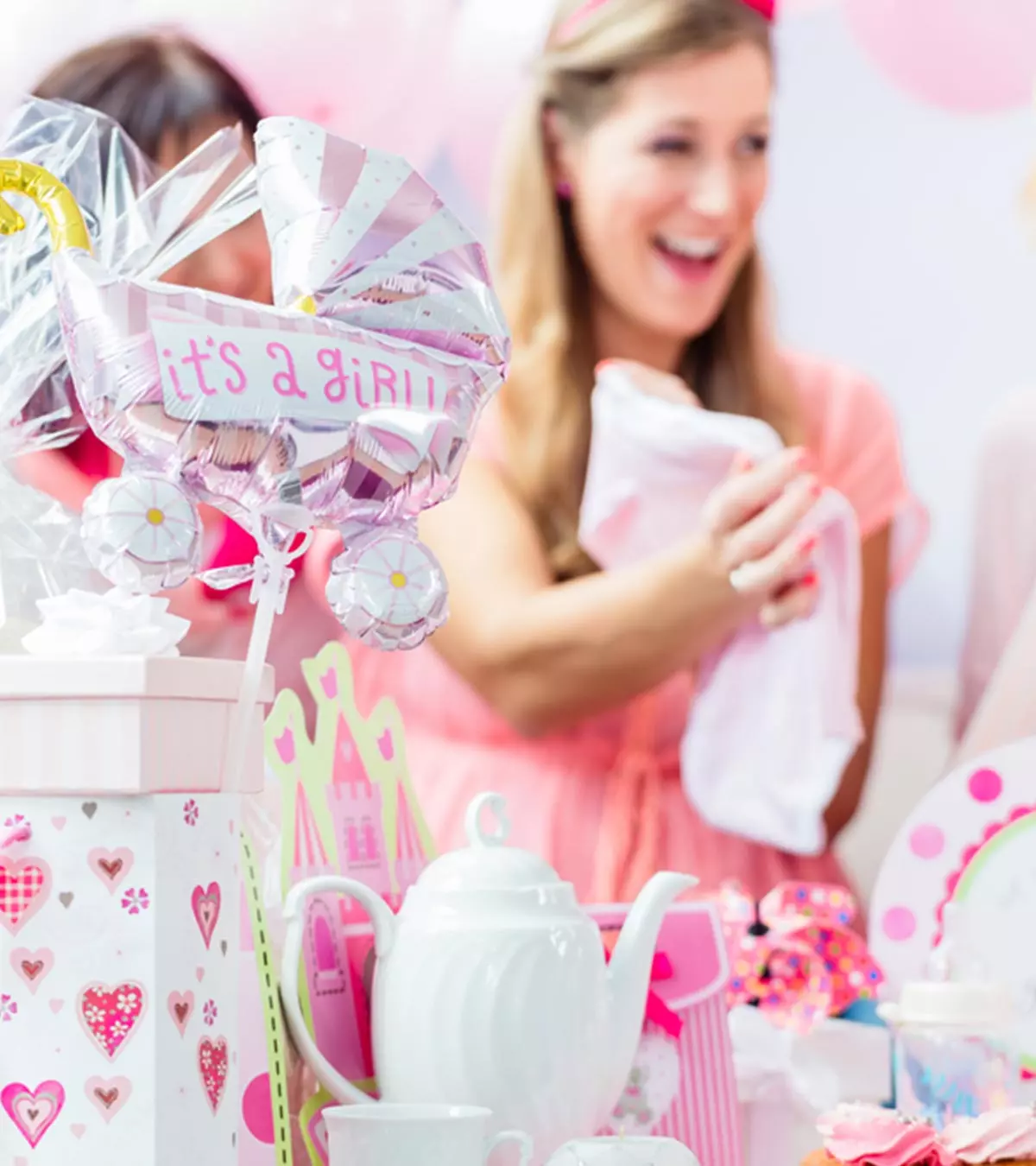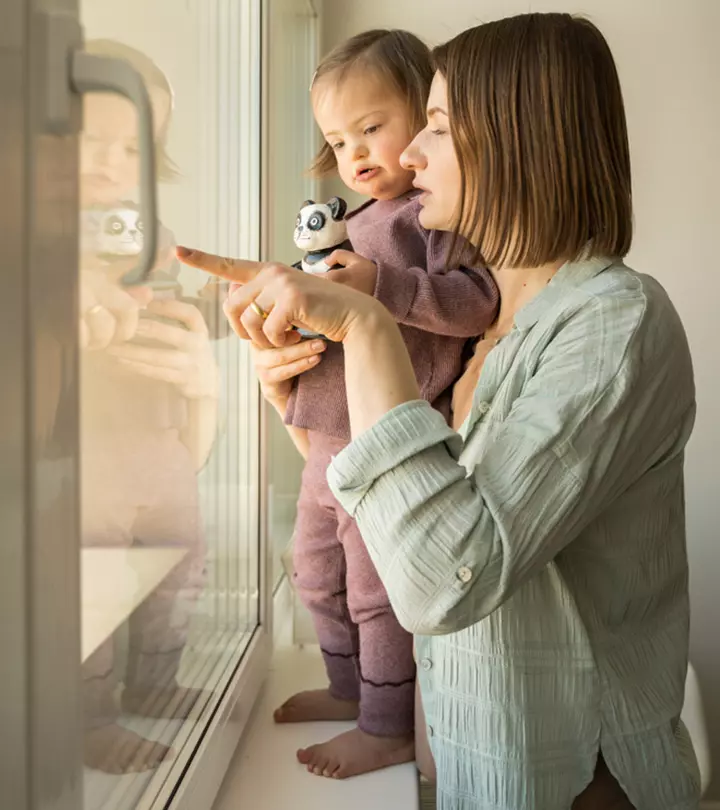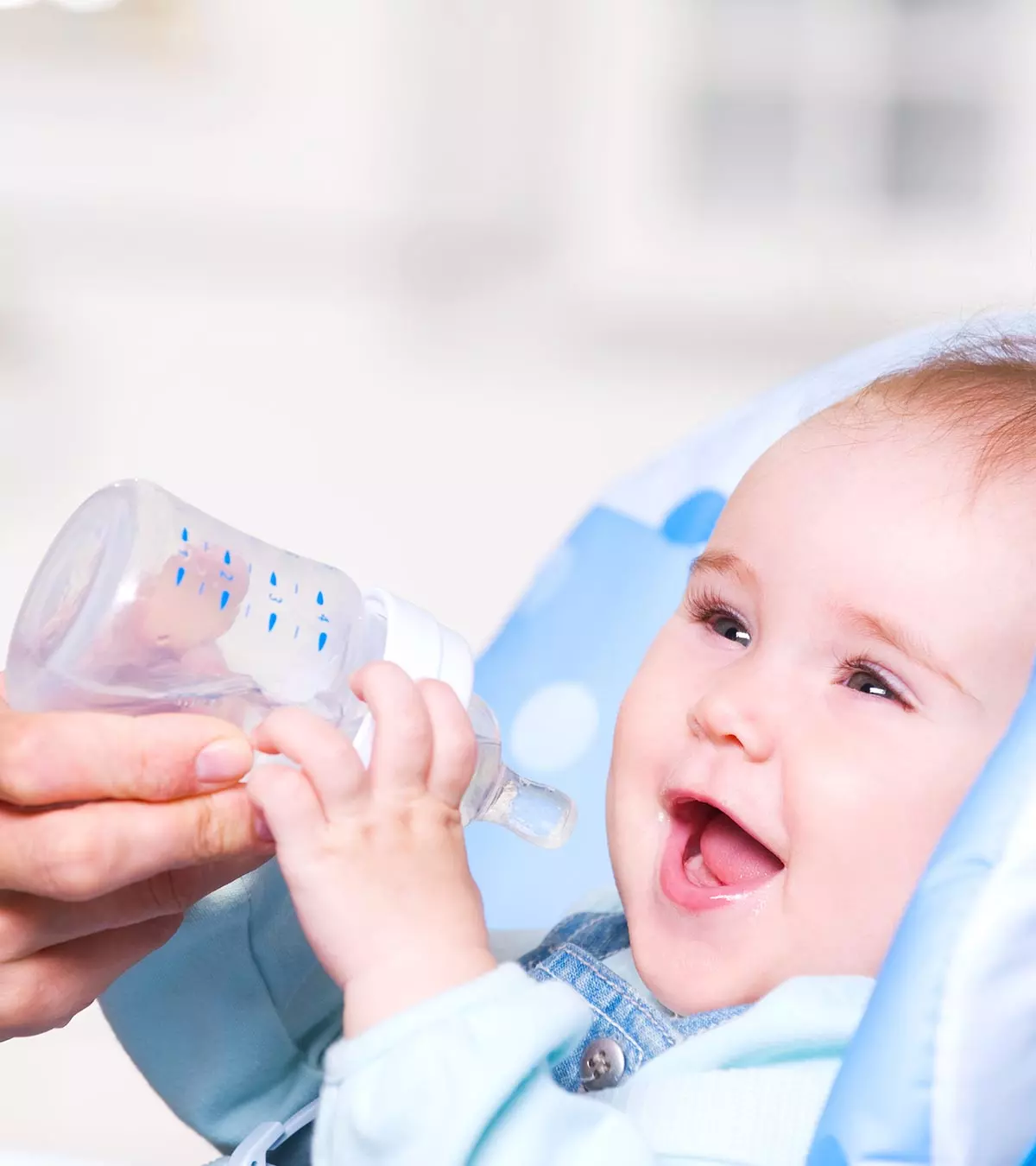
Image: ShutterStock
If it’s a hot, sunny day, you might wonder if it is safe to give water to your six-month-old baby. While you may be aware of when to start your baby’s solid food diet, the information about water consumption may not be well known. So, when can babies drink water? The right time depends on the age, different activities, and the child’s food intake. Moreover, it is important to introduce small quantities to avoid any discomfort. You need to adopt certain measures while hydrating your baby to ensure it does not adversely affect their health. So, if you have similar queries, read on! In this post, we will tell you about water for babies, including the right time, the adequate quantity, preventive measures, and the right ways to feed it to your little one.
Key Pointers
- Introduce water to your baby after they have started consuming solids and are six months old.
- Giving water to infants under six months old can affect nutrient absorption, cause dehydration or water intoxication, and reduce their appetite for breast milk.
- Limit water intake to 2-4 ounces per day and use a cup with a straw or soft spout to promote oral development.
- Help your baby learn to hold a cup and tilt it to drink water by providing colorful cups and attractive straws.
- Offer water-rich foods such as watermelons, oranges, and grapes to your baby.
When Can Babies Drink Water?
Once your baby is six months old, you can begin giving water in small amounts. This is the time when you introduce solid foods, and also when she gets more active. You can also offer clear soup but not soda or other sugary drinks. You may start with a sippy cup, spoon, or bottle feeder.
However, excessive water intake in infants can sometimes lead to abdominal discomfort and various medical issues that require immediate medical attention. Thus, it is crucial to seek advice from a doctor, particularly a pediatrician, if such symptoms arise (1).
Is It Not Safe To Give Water Before Six Months?
It is, usually, not for the following reasons (1) (2).
- Affects nutrient absorption: Water fills the baby with empty calories and can affect her ability to absorb nutrients from breastmilk or formula. Breast milk or formula has enough water, extra water makes kids pass more urine. It can lead to weight loss and elevate the levels of bilirubin, and also increase the risk of infection.
- Water intoxication: Too much water can cause water intoxication in babies, thus diluting the nutrients in the body. It may result in seizures, reduced body temperature, edema, and altered mental status (such as increased irritability) (15). According to a Penn State College of Medicine study, neonatal seizures were reported in around 80 to 120 cases per 100,000 live births per year (16).
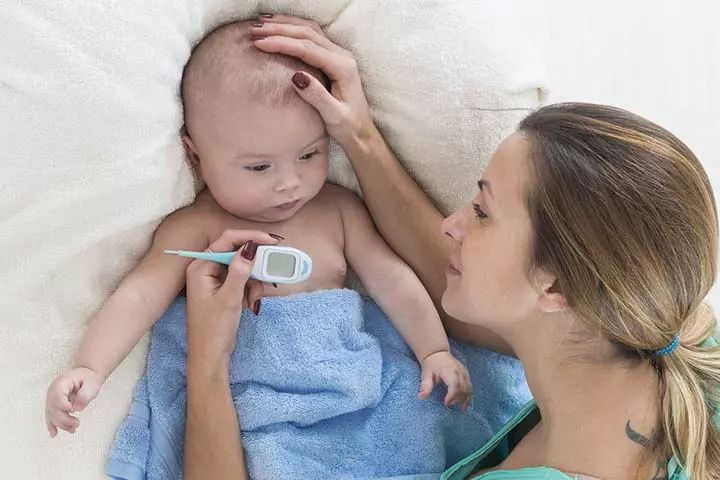
- Dehydration: According to the researchers at Johns Hopkins Medicine, US, babies younger than six months should not be given water (3) as their kidneys are still not developed, they flush out sodium, along with excess water. The researchers at Johns Hopkins Medicine, US, have provided support for this statement, which has been thoroughly studied and proven (3).
- Excess water can stimulate the kidneys to flush out sodium and electrolytes causing dehydration.
- No appetite for breastmilk: The baby’s tummy is full with water and she would not want to drink breast milk. This will make her miss on her daily dose of nutrients (4).
How Much Water Should A Baby Drink After Six Months?
Water For Babies Aged Six To 12 Months
When you start to give solid food around six months, the baby’s intake of milk reduces from 25-30oz to 14-25oz a day. This, however, depends on the kind of solids you introduce and the frequency with which the little one eats.
Along with breastmilk or formula, she may not require more than two to four ounces of water every day (5). If your child is very active, you can provide some more water occasionally.
 Point to consider
Point to considerWater For Babies Older Than 12 Months
When your baby enters the 12th month, the milk intake reduces to 16oz a day. By this time, you may have introduced a variety of foods and established a routine of breakfast, lunch, and dinner. Therefore, with the reduced milk consumption, varied food intake and increased activity, your child’s need for water increases naturally (6).
According to the United States Department of Agriculture, toddlers need around 1.3 liters of water every day (7). It includes water from milk, food and other sources. Proper hydration will help ease bowel movements and replenish lost fluids.
What Kind Of Cup Or Bottle Is Best To Use?
You may have to choose different kinds of cups or bottles depending on the age of your little one.
Around six months: At this ideal age to introduce water, use a cup containing handles and a straw or soft spout. You should choose a non-spill valve that is removable. The free-flow cup will help your baby to drink without sucking. This also helps oral development as she uses different muscles to drink.
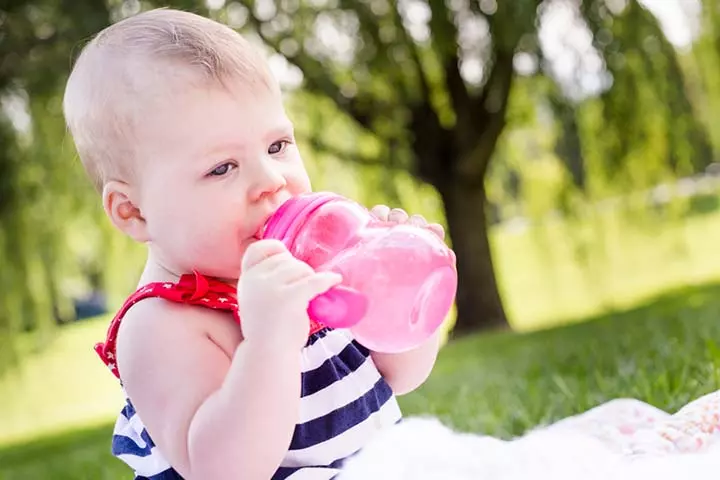
If the baby is transitioning from breastmilk to formula, a bottle with a breast-like nipple should suit her. Your baby’s latch will be natural.
Around 12 months: This is the age you can assist them in drinking from cups. If she is already drinking from a spout or straw, moving to cups is easier for her. You can use a sports cup or an open cup. A non-spill valve is ideal.
How To Give Water To The Baby?
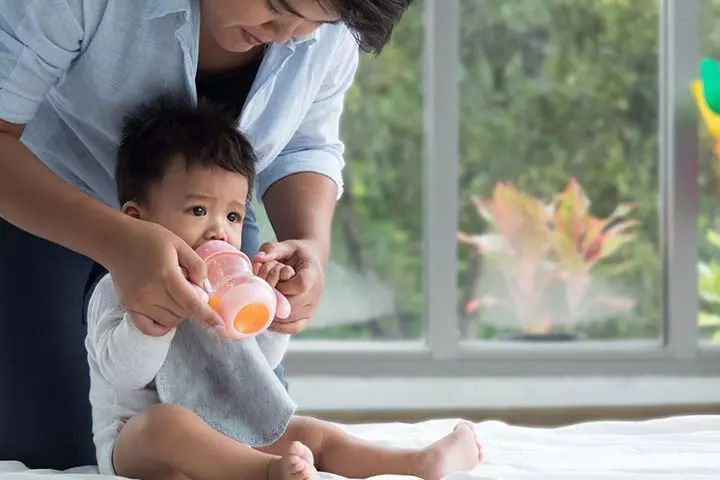
You should make sure the baby is drinking water carefully. The following instructions may be of some help:
- Teach your baby to hold a cup/glass.
- Then help her tilt the cup just enough to make the water flow steadily.
- Hold the cup as she drinks from it.
- You will have to do this regularly before she can hold the cup without your help and without spilling the content.
- To ensure maximum safety, consider using no-spill sippy cups to prevent water spillage. These cups are safe even if they are turned upside down, as the water does not come out unless the baby sucks it.
- You may experiment with multiple sippy cups until you find the one that is comfortable for your baby.
Follow these basic guidelines to introduce your baby to water, and keep her hydrated.
Some Additional Measures To Keep Your Baby Adequately Hydrated
You can make the early days of water consumption interesting and healthy for your baby. Here are a few tips:
- Let your baby have small quantities frequently. Give small amounts of water or watery fluids all through the day.
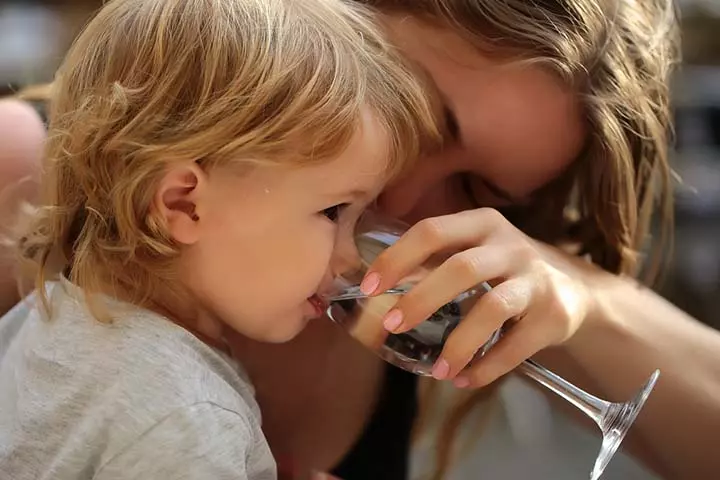
- Use colorful cups and differently shaped straws so that your baby will be excited about drinking water. Since babies are not acquainted with sipping from straws, they need some training. Youtuber, who goes by the name ‘Workingmama’ shares her practical approach to teaching her baby how to drink from a straw. She says, “To begin with, I introduced my baby to the concept of liquid coming out of a straw. Initially, they won’t understand the idea of sucking because it’s entirely new to them. So, I would fill the straw with liquid, block it with my finger, and then offer it to the baby. It helped them associate the straw with liquid.
“After this, the next step is encouraging them to try drinking independently. It’s important to note that the length of the straw affects how challenging it is for them to suck the liquid since it comes from the bottom. We gradually transitioned to longer straws, but each stage takes time and patience (i).”
- Be wary of weather conditions and activities. Give enough water during activity time, and in hot weather. Let them take at least four ounces every 20 minutes.
- Give more water-rich foods such as soups or fruits like orange, watermelon, and grapes. Flavor water with lime, lemon, oranges or cucumber to make drinking fun.
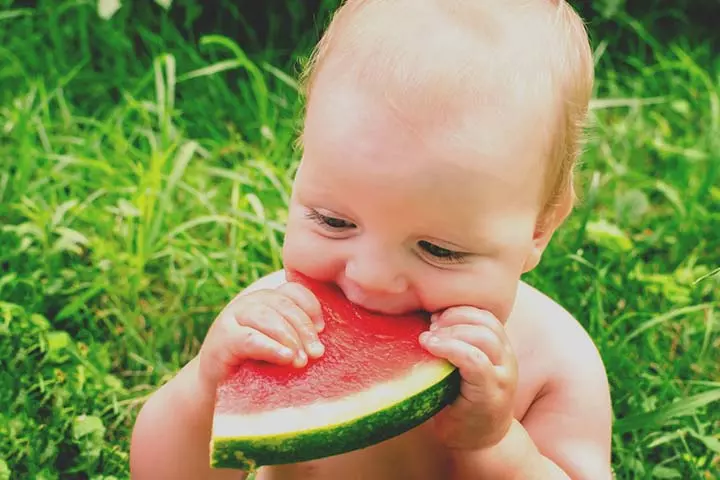
- You can replace the lost fluids by giving your baby formula, breastmilk or a rehydration solution. However, it is not recommended to give plain water to infants below six months to rehydrate their bodies or quench their thirst.
 Quick fact
Quick fact Do not be in a hurry to introduce water to your baby. In the first six months, breastmilk is everything for her –food, water, fruits, and vegetables all packed in one. Introduce water gradually after six months but make sure the baby is not drinking so much that she loses her appetite.
Frequently Asked Questions
1. Should I give boiled water to babies?
Yes, it is good to boil and cool the water for your baby. Boiling kills the microorganisms that could potentially cause contamination, thereby lowering the chances of infection or any adverse impact on the immune system. According to the American Academy of Pediatrics, sterile water should be used for babies even while preparing infant formula (8).
2. Can babies drink bottled water?
It is not safe to give standard bottled water to babies as it is likely to be high in sodium and sulfate content. Bottled water for babies may be considered if it contains no added minerals or other additives. Give water that is low in sodium and sulfates. One liter of water should contain less than 200mg of sodium (Na) and 250mg of sulfate (SO or SO4). Choose options labeled as purified, deionized, demineralized, and distilled (9).
3. Can I dilute the formula with water?
Do not add excess water to dilute the formula feed. Read the directions for making formula and add the recommended amount. Adding excess water can only raise the risk for water intoxication, wherein your baby takes in fewer nutrients than what she should.
4. When can babies drink tap water?
You can start giving tap water from the time you introduce water to your baby but make sure the water is not fluorinated. You can also use a water filter so that filtering removes certain additives such as chlorine and fluoride to keep the tap water fresh (10).
5. Can I give juice to drink?
You may give juices to your baby when they are 12 months old. But ensure it is 100% fruit juice without any added sugars or preservatives, or else it increases the risk of tooth decay and intolerance (11). Give as less as four ounces per day, along with a meal or a snack, because juice can fill up their tummy. Excessive fruit juice consumption can adversely affect the baby’s digestive system, which may lead to diarrhea, vomiting, and weight gain (12). It may also cause diaper rash or allergies (13).
Based on expert recommendations, it is advised to exclusively breastfeed babies below the age of six months. This is because the intake of water can potentially fill up the baby’s stomach with empty calories, leading to a reduced intake of essential nutrients. Further, excess water intake in this period can cause their underdeveloped kidneys to flush out necessary sodium and electrolytes. The gradual introduction of water to babies can be done through the use of a bottle, spoon, or sippy cup, starting at around six months of age. Babies between six and 12 months will only require two to four ounces of water along with breastmilk or formula. Hence, ensure not to give them excess water or lose their appetite.
Infographic: Beverages Your Baby Must Avoid Before Their First Birthday
Several drinks should be avoided from being given to babies younger than a year old to lower the risks of tooth decay and other complications. The following infographic contains a list of such beverages. Give it a read and save it for future reference. Illustration: Momjunction Design Team
Illustration: When Can Babies Drink Water? Right Age And Ways To Feed Them

Image: Stable Diffusion/MomJunction Design Team
Personal Experience: Source
MomJunction articles include first-hand experiences to provide you with better insights through real-life narratives. Here are the sources of personal accounts referenced in this article.
i. Straw Training for Baby or Toddler | How to Train Baby to Drink from a Straw | Sippy Cup Alternative.https://www.youtube.com/watch?v=D2fEzwY3dRo&feature=youtu.be
References
- Water Intoxication in Infants.
https://www.stlouischildrens.org/health-resources/pulse/water-intoxication-infants#:~:text= - When can babies drink water?
https://www.pregnancybirthbaby.org.au/when-can-babies-drink-water#:~:text=If%20your%20baby%20is%20under - Bottle-Feeding.
https://www.hopkinsmedicine.org/health/conditions-and-diseases/bottlefeeding - Breastfeeding.
https://www.who.int/news-room/questions-and-answers/item/breastfeeding#:~:text=Amount%20at%20each%20meala&text=Why%20can’t%20we%20give - Weaning your child from breastfeeding.
https://www.ncbi.nlm.nih.gov/pmc/articles/PMC2720508/ - Feeding Your Baby the First Year.
https://health.hawaii.gov/wic/files/2013/05/feeding_your_baby_the_first_year.pdf - Dietary Reference Intakes for Water, Potassium, Sodium, Chloride, and Sulfate (2005), Chapter:4 Water.
https://nap.nationalacademies.org/read/10925/chapter/6#74 - Boil Water Faqs.
https://www.vdh.virginia.gov/drinking-water/boil-water-faqs/#7 - Infant formula
https://www.cdc.gov/fluoridation/faq/index.html - Medline NIH Plus The Magazine.
https://magazine.medlineplus.gov/pdf/MLP_Summer2012web.pdf - Food intolerance
https://heas.health.vic.gov.au/resources/allergies-intolerances/food-intolerance/ - Diarrhea In Infants
https://medlineplus.gov/ency/article/002118.htm - Heyman, Melvin B, et al., (2017), Fruit Juice in Infants, Children, and Adolescents: Current Recommendations.
https://escholarship.org/uc/item/40q8484s - When can my baby have water to drink?
https://www.nct.org.uk/information/baby-toddler/feeding-your-baby-or-toddler/when-can-my-baby-have-water-drink - Hyponatremic Seizures Among Infants Fed with Commercial Bottled Drinking Water — Wisconsin 1993.
https://www.cdc.gov/mmwr/preview/mmwrhtml/00032470.htm - Conrad Krawiec and Maria Rosaria Muzio; (2023); Neonatal Seizure.
https://www.ncbi.nlm.nih.gov/books/NBK554535/
Community Experiences
Join the conversation and become a part of our nurturing community! Share your stories, experiences, and insights to connect with fellow parents.
Read full bio of Dr. Raju C Shah
Read full bio of Swati Patwal
Read full bio of Rohit Garoo
Read full bio of Anindita Ghatak











